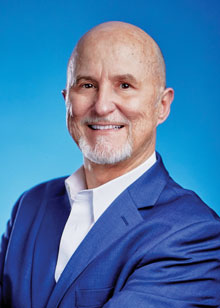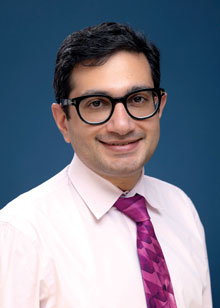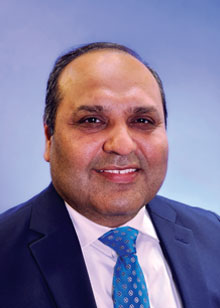Work Group Develops New Resources to Support IMG Members
Abstract
A new APA resource guide provides vital information for international medical graduates (IMGs) before, during, and after residency, and a free initial immigration attorney consultation service launched this year connects IMG members to immigration lawyers.
International medical graduates (IMGs) play an important role in the field of psychiatry. Those residing in the United States often work in the public sector and are more likely to accept Medicaid and Medicare. They are also more likely to work in medically underserved and health professional shortage areas.

The needs of IMGs are numerous, multifaceted, and change throughout their careers, said Daniel Castellanos, M.D.
The long path to becoming a psychiatrist in this country is not easy for IMGs, however. They face unique challenges, and studies show that their numbers within the psychiatric workforce may be dwindling in the United States. National Resident Matching Program data indicate that the overall number of IMGs entering psychiatry training as a PGY-1 declined from approximately 30% in 2013 to 16.1% in 2023. To help support APA’s IMG members, the Joint Reference Committee created an IMG work group that had its first meeting in May 2022. The work group was charged with developing an action plan to address the unique needs of IMG members.
Composed of IMGs who attended medical schools around the world, the work group has been working diligently to develop a robust array of recommendations and actions that APA can take to address the numerous challenges IMGs experience while also raising awareness about the benefits they bring to psychiatry in this country. The work group was initially co-chaired by Vishal Madaan, M.D., APA’s chief of education, and Daniel Castellanos, M.D., founding associate dean of graduate medical education at Creighton University School of Medicine-Phoenix. It was later co-chaired by Castellanos and Raman Marwaha, M.D., president of the IMG Caucus.
Marwaha noted the significant need to ensure IMGs thrive in the United States. Not only do they increase the diversity of the psychiatric workforce, but also they can play a hugely important role in filling significant workforce gaps, he pointed out.
“We all know there is a big workforce shortage right now,” said Marwaha. “We need more psychiatrists, and especially more subspecialty psychiatrists. Yet we have a lot of excellent IMGs who are going unmatched year after year.”

IMGs can play an essential role in addressing the ongoing psychiatric workforce shortage in the United States, said Raman Marwaha, M.D.
The work group focused specifically on IMGs working in the United States, regardless of their country of origin, from residency through seven years after medical school. The group outlined actions that APA could take in a nearly 70-page report for the Joint Reference Committee based on the results of a survey the work group conducted; more than 800 IMG members responded. Among the topics identified, IMGs expressed their need for assistance navigating the residency application process, access to mentorship opportunities, and support with the immigration and visa process.
Based on the results of the survey, the work group set out to develop a robust and far-reaching resource guide, which is available on APA’s website. The resource guide includes detailed information tailored for IMGs. Its topics range from a list of observerships and clerkships in psychiatry for pre-residency IMGs to information on paths to career development in the United States for early career IMGs.
“The work group worked on this resource guide as a tangible, practical solution to help address issues ranging from observership opportunities to immigration and acculturation,” said Madaan, who is also an APA deputy medical director. “We will review the resource guide on an annual basis to make sure it stays updated with the latest information IMGs need.”
In addition, the APA medical student membership category is being expanded to include all medical school graduates who don’t immediately qualify for the resident-fellow membership category and haven’t matched into another specialty.

“IMGs in the U.S. have dual learning curves since they navigate immigration issues and acculturation along with clinical learning,” said Vishal Madaan, M.D. APA’s new free initial consultation with an immigration attorney “provides them an opportunity to get an informed response and guidance on personal immigration issues within seven days of their query.”
Further, at the work group’s recommendation, APA has implemented a free initial immigration attorney consultation service for IMG members. Through the service, IMGs have access to one free 30- to 45-minute consultation with an immigration attorney who can provide them with advice related to their visa or residency status.
Ensuring IMGs receive support from APA related to their visa or immigration status is an important aspect of supporting their overall well-being, Castellanos said. “People need this extra support,” he said. “It’s not just a person’s physical and emotional health that plays into their well-being. If they have immigration insecurities, that’s going to play into everything they do and impact them personally, professionaly, and financially.”
In the effort to meet IMGs’ need for greater connection, Marwaha noted that the IMG Caucus has started hosting webinars, the most recent of which was on residency applications and interviewing. “We did live mock interviews and had an amazing panel of program directors who gave advice,” he said. The caucus plans to do more of those webinars, with topics ranging from research opportunities to ways to engage in advocacy.
IMGs add a lot of value to both APA and psychiatry as a field, Madaan said. “They represent very diverse perspectives,” he said. “They’ve successfully navigated extremely challenging hurdles and life experiences and often bring with them a great deal of resilience to their training programs and workplaces. This is a unique strength and an exemplary trait that easily extends to patient care and well-being.” ■



